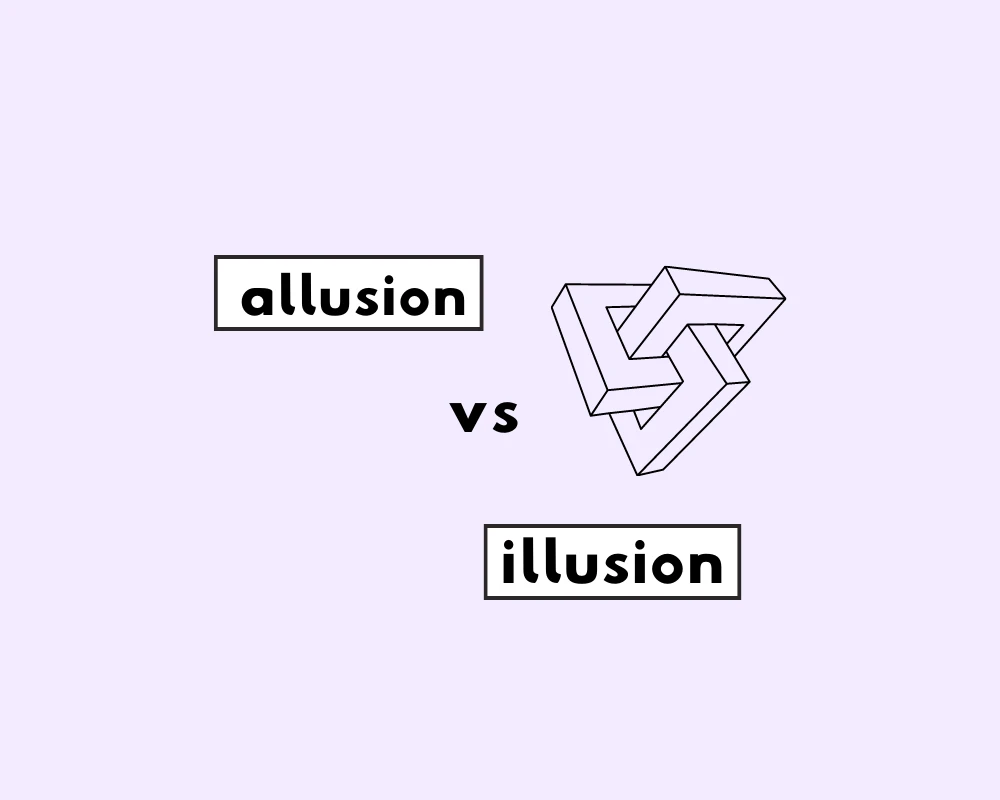Contents
Toggle
When to use “illusion” or “allusion”?
Are we describing deceptions of the mind, or making subtle hints towards something? If it’s the former, we call it an illusion; the latter is an allusion. Let’s explore the distinction between this pair of homophones, (which is a fancy term to describe words that sound the same but mean different things!)
Allusion vs. illusion
Because allusion and illusion share pronunciations, people often get them confused with one another. Here’s the thing: they’re not at all similar in meaning, despite their similar sound and shared etymology (both deriving from Latin, ludere, “to play”).
| Examples with ‘allusion’ | Examples with ‘illusion’ |
| The comedian’s jokes were riddled with pop culture allusions that resonated with the younger audience. | Floor-to-ceiling windows gives the illusion of extra light. |
Allusion is a noun that means, “an implied or indirect reference especially in literature: e.g., a poem that makes allusions to classical literature.” The corresponding verb form of allusion is allude (not to be confused with elude, which are also homophones that are etymologically derived from the Latin word, ludere).
In the play, the director made many allusions to the play Les Miserables.
I don’t always pick up on the allusions made in poetry.
The lyrics contain biblical allusions.
Illusion, which is a noun, refers to “a misleading image presented to the vision: an optical illusion.” In this way, illusion is similar in meaning to hallucination or a delusion, and generally refers to something that deceives or misleads the mind. See the sentence examples below.
A mirror gives the illusion of extra space.
The watering hole in the desert was just an illusion.
They used paint to create the illusion of metal.
Examples with “allusion” in sentences
1. The author’s use of biblical allusions added a layer of depth to the novel’s themes.
2. Her speech was filled with subtle allusions to classical literature, which only the well-read audience members caught.
3. The painting contained hidden allusions to famous works of art, creating an intricate web of references.
4. The comedian’s jokes were riddled with pop culture allusions that resonated with the younger audience.
5. The film’s title was a clever allusion to a famous Shakespearean phrase, hinting at the movie’s themes.
Examples with “Illusion” in sentences
1. The magician’s performance created the illusion of a disappearing act, leaving the audience in awe.
2. The shimmering oasis in the desert turned out to be a mirage—an optical illusion caused by the heat.
3. Many people believe that fame and wealth will bring happiness, but often, it’s just an illusion.
4. The painting’s use of light and shadow gave the illusion of depth, making the artwork come alive.
5. The architect used clever angles and mirrors to create the illusion of a larger space in the small room.
Allusion synonyms
Remember that synonyms do not exactly match the meaning of the words that they are synonymous with. This means that you have to be mindful of the synonym you select in the relevant context.
- reference
- hint at
- intimation of
- mention of
- suggestion of
- implication
- citation of
- insinuation
- remark about
- comment on
Illusion synonyms
- mirage
- hallucination
- apparition
- fantasy
- figment of the imagination
- phantasm
- vision
- chimera
- delusion
- spectre (a ghost or visible disembodied spirit)
- ignis fatuus (Latin term meaning, literally, “foolish fire”)
- will-o’-the-wisp (something that is impossible to get or achieve)
Origin of allusion
1540s, “metaphor, parable” (a sense now obsolete); 1550s, “word-play, joke;” 1610s as “passing or casual reference,” from Latin allusionem (nominative allusio) “a playing with, a reference to,” from p.p. alludere “to play, jest, make fun of,” from ad “to” (see ad-) + ludere “to play”. An allusion is never an outright or explicit mention of the person or thing the speaker seems to have in mind.
Origin of illusion
Mid-14c., “mockery, scorning, derision;” late 14c., “act of deception; deceptive appearance, apparition; delusion of the mind,” from Old French illusion “a mocking, deceit, deception” (12c.), p.p. of illudere “mock at,” literally “to play with,” + ludere “to play” (see ludicrous). Sense of “deceptive appearance” first developed in Church Latin. (1920).
In review: allusion and illusion
An “allusion” is a reference made in a text or speech to another work, historical event, person, or cultural element. It’s a way of indirectly referencing something without explicitly mentioning it. An “illusion” refers to a deceptive or misleading perception of reality. It’s something that appears to be real but is not what it seems.
Read about other commonly confused words
Sources
- Wikipedia. 2023. “Will-o’-the-wisp.” Wikimedia Foundation. Last modified August 14, 2023. https://en.wikipedia.org/wiki/Will-o%27-the-wisp.
- “Ignis fatuus.” Merriam-Webster.com Dictionary, Merriam-Webster, https://www.merriam-webster.com/dictionary/ignis%20fatuus. Accessed 15 Aug. 2023.
- Harper, Douglas. “Etymology of illusion.” Online Etymology Dictionary. Accessed 15 August, 2023.










